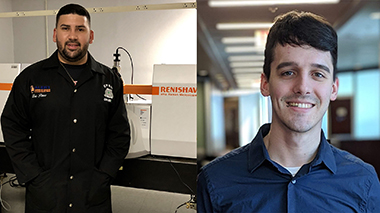Grad Training Program in RNA Sciences Continues to Grow in its 6th Year
 |
|
The 2020-21 RNA Institute Fellows cohort includes Luis Perez Almodovar, at left, a chemistry PhD candidate, and Tristen Head, a nanobioscience PhD candidate from SUNY Poly.
|
ALBANY, N.Y. (Oct, 1, 2020) — the sixth cohort of RNA
The University’s sixth cohort of RNA Fellows Program graduate students for PhD training in RNA science relating to health and disease. The program aims to develop future science leaders by providing graduate students with a comprehensive access to faculty, techniques and collaborations within UAlbany, SUNY Polytechnic Institute and the RNA Institute.
A record number of fellows tops the previous mark of 12 from a year ago, when a $1.114 million grant from the National Institutes of Health allowed the yearly number of new fellows to increase by three for each of the years 2019-2023. Additional support comes from the UAlbany departments of Biological Sciences, Biomedical Sciences and Chemistry, the Office of Graduate Education, and SUNY Poly.
Begley quote:
Working in the labs of UAlbany and SUNY Poly scientists, the fellows take an RNA-centric curriculum of courses and colloquia in one of three academic departments in the University or the PhD program in nanobioscience at SUNY Poly. Optional tracks were also created in 2019 that allow fellows to increase their entrepreneurship skills and achieve writing excellence through programs with the School of Business and the Writers Institute, respectively.
This intensive RNA science experience, which uses the state-of-the-art facilities of The RNA Institute and SUNY Poly, is one that the vast majority of RNA fellows has appreciated since the program’s beginnings in 2015. This year’s cohort seems no exception.
“I applied for this program because it offers incredible tools for my development as a professional and a researcher,” said Luis Perez Almodovar, a chemistry PhD candidate who works in the lab of Mehmet Yigit, UAlbany associate professor in Chemistry. “In this program, you can also meet other people who work in different fields and topics, so I consider this to be an excellent opportunity to develop my scientist career.”
Tristen Head, a PhD candidate working in the SUNY Poly lab of Nathaniel Cady, applied to the fellow program to supplement his education in the nanoengineering program at SUNY Poly and to inform his doctoral research in drug delivery. “The RNA fellowship is a fantastic opportunity to dive deep into RNA biology and gain theoretical and experimental knowledge within a network of leading researchers," he said.
The full list of this fall’s new RNA Fellows, with their fields and the faculty whose labs they work in, is:
- Amir Agharezaee (Chemistry, Associate Professor Maksim Royzen)
- Luis Perez Almodovar (Chemistry, Associate Professor Mehmet Yigit)
- Phenoah Badu (Biology, Associate Professor Cara Pager)
- Sara Evke (SUNY Poly, J. Andres Melendez and Professor Thomas Begley)
- Rachel Fay (Biomedical Sciences, Assistant Professor Alexander Ciota)
- William Gasperi (Biology, Professor Thomas Begley)
- Tristen Head (SUNY Poly, Professor Nathaniel Cady)
- Mahera Kachwala (Chemistry, Associate Professor Mehmet Yigit)
- Raghu Katreddi (Biological Sciences, Associate Professor Paolo Forni)
- Noor Kobt (Biomedical Sciences, Associate Professor Prashanth Rangan Rangan)
- Avinash Londhe (SUNY Poly, Associate Professor Ben Boivin)
- Christopher Smith (Chemistry, Associate Professor Mehmet Yigit)
- Ed Zandro Taroc (Biology, Associate Professor Paolo Forni)
- Ryan Treen (Biomedical Sciences, Associate Professor Anil Ojha)
- Dana Woodstock (Biology, Assistant Professor Sammons)
![]() For more news, subscribe to UAlbany's RSS headline feeds
For more news, subscribe to UAlbany's RSS headline feeds
A comprehensive public research university, the University at Albany-SUNY offers more than 120 undergraduate majors and minors and 125 master's, doctoral and graduate certificate programs. UAlbany is a leader among all New York State colleges and universities in such diverse fields as atmospheric and environmental sciences, business, education, public health,health sciences, criminal justice, emergency preparedness, engineering and applied sciences, informatics, public administration, social welfare and sociology, taught by an extensive roster of faculty experts. It also offers expanded academic and research opportunities for students through an affiliation with Albany Law School. With a curriculum enhanced by 600 study-abroad opportunities, UAlbany launches great careers.


